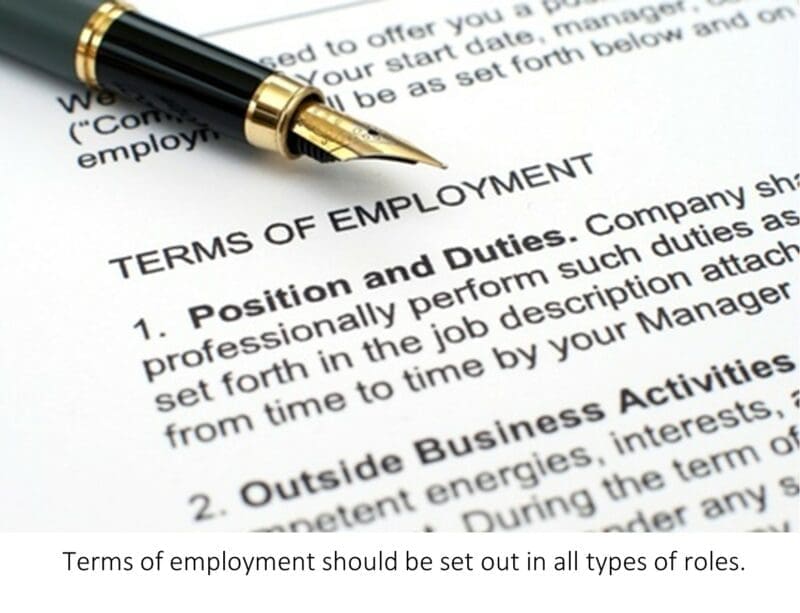In this post
Employment contracts are used in companies to set out when and why someone is employed. By doing this an employee and employer will be able to outline the duties that should be carried out as well as working hours, responsibilities and what standards must be achieved. The different types of contracts used in the UK include:
- Full-time contracts
- Part-time contracts
- Fixed-term contracts
- Freelance, consultants’ and contractors’ contracts
- Agency staff contracts
- Zero-hour contracts
Full- and part-time contracts
With a full- or part-time contract an employee will have the same rights but with some small exceptions. Anyone that is employed in a full- or part-time role should have a number of benefits in their job including:
- A contract or written statement of employment
- A statutory minimum number of holidays
- Pay slips that detail wages and tax deductions
- Statutory rest breaks
- Statutory sick pay
- Maternity, paternity or adoption leave
- A safe place to work
- Be paid the minimum wage with taxes and national insurance contributions organised by the employer
- Liability insurance must be in place
Employees are used to ensure that a company can operate according to its philosophy and provide a great service. Having full- or part-time staff gives the best opportunity for employees to work hard and integrate fully into the business. These types of employment can be very expensive though, as holiday pay, statutory sick pay, pensions, maternity leave etc. must all be accounted for. It can also be much harder to remove underperforming staff from a full- or part-time role and this process is often difficult. The benefits are that staff will feel more comfortable in their role and are guaranteed working hours.
Fixed-term contracts
A fixed-term contract is used to outline employment that is not for a long period. Employees are entitled to the same rights as those in full- or part-time positions but there will be a fixed end to this contract. This type of agreement must:
- Last for a specific period of time and be set for a specific task
- End when the task is complete or the time period is up
A fixed-term contract will give security to an employee and be short term so that the company can pay for someone to complete a task that it needs.
Agency staff
When employing staff from an agency, a company must be sure to put in place specific contracts. Obligations for agency staff will include:
- Paying the agency for the service provided – either hourly or in a lump sum
- Making sure that the employee has the same access to facilities as others
- Ensuring health and safety standards
- Providing an agency with copies of terms and conditions of employment in the organisation
Organisations that use agency staff typically do so because of fluctuations in demand. This may include seasonal work or companies that offer products or short-term services. During busy periods or times when staff are on maternity or sick leave, a company may need to get agency staff as this is a quick fix to issues and allows the business to continue offering products and services.
Freelance staff, consultants and contractors
Freelance workers and consultants are often self-employed or work for a different company. Because of this they have responsibilities for their own health and safety (within reason) and usually command a higher fee than full-time staff. This type of contract requires a person to:
- Ensure that they contribute to national insurance payments and taxes
- Be entitled to the same rights as full- or part-time employees

When there is a lack of skills in an organisation, freelancers may be employed. This type of employment can be very expensive and may cause issues with existing staff members who may feel inadequate.
Zero-hour contracts
This type of contract will not give regular work to an employee and is often used for relief work or employment that is seasonal. By doing this a company can only hire staff if and when needed. The employer:
- Can call on the person only when required
- Is not obliged to give any work at all
- Do not have to accept work when asked
- Has a responsibility for health and safety
The flexibility of these contracts is great for employers but employees cannot guarantee they will be working. For this reason, zero-hour contracts are not the preferred method of employment for staff as they lose out on a lot of benefits such as a steady wage, maternity leave or statutory sick pay.
Flexible hours
Many modern businesses now use flexible hours for their staff. Since the world is no longer 9-5, flexible hours can enable a company to operate for longer periods during the day and help staff to fit their work around other commitments. Flexible working can extend into a number of factors and is not just related to the time that a person works. It can be linked to:
- Where a person works
- How many hours a person works in a day/week
- The hours that a person starts and finishes work
- If a person can job share
Allowing staff to be flexible with their hours will result in them being happier in their role. Being able to fit in other commitments, such as caring for children, will mean that a business can attract the best possible candidates for a role and keep them long term.



